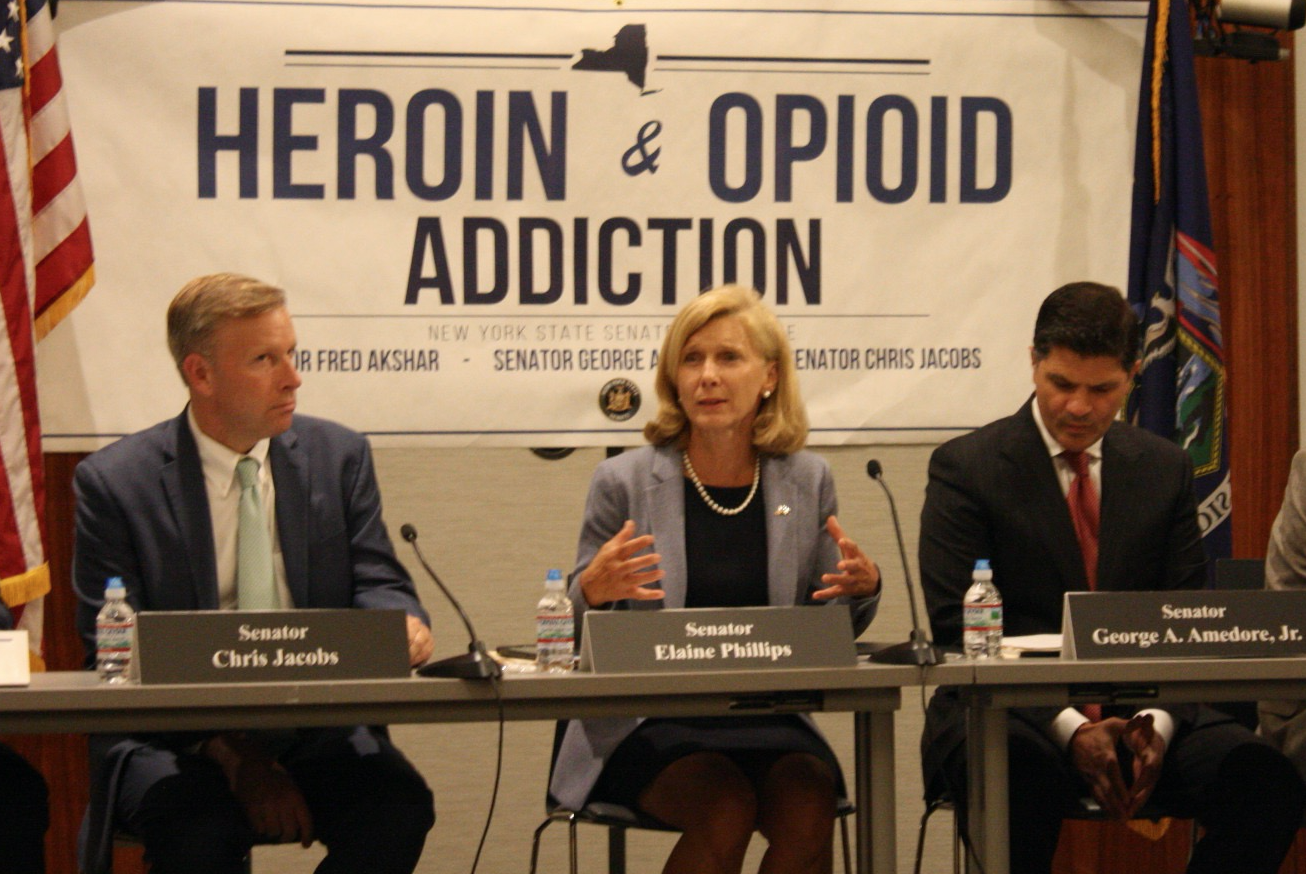Linda Ventura pulled out the ashes of her son contained in a plastic tub and showed it to the audience at the Heroin and Opioid Addiction forum held at NYU Winthrop Research and Academic Center in Mineola on July 19.
“This is my son now, this is my reality, this is what I wake up to,” Ventura, the founder and president of Thomas’ Hope Foundation, which is dedicated to promoting drug addiction awareness and prevention, said. “So not one more [death], this is the reality of what this is doing to our society.”
She lost her 21-year old son to a drug overdose in March 2012.
Ventura is among many people who spoke at the forum, which brought together legislators, people in long-term recovery, law enforcement officials, doctors, and treatment providers. Everyone shared their ideas about how to tackle substance abuse with the legislators.
Senators George Amedore, Jr. and Chris Jacobs, co-chairs of the Joint Senate Task Force on heroin and opioid addiction, hosted the forum with Senator Phillips. Senator Fred Akshar, who is also a co-chair, was not present. Senators Kemp Hannon, Phil Boyle, Todd Kaminsky, Assemblywoman Christine Pellegrino and Assemblyman Dave McDonough were also present.
“While we have made tremendous progress with the legislation and crucial funding, it’s imperative to have forums like this to shed more light on what we can do to continue addressing this ongoing public health crisis,” Senator Phillips said. “We need new and innovative ideas, intervention and education.
In April, Newsday reported that nearly 500 people died on Long Island from opioid overdoses in 2016. In Nassau County, it was reported that 190 deaths were from opioid overdose, up from 177 in 2015.
Law enforcement officials talked about how the “system,” limits their ability to help those afflicted with substance abuse.
“We are narcan-ing kids, sometimes the same kid three times in the same weekend. HIPAA, I understand is to protect the patient but the police department is not getting the data, we need the data,” Patrick Ryder, the Nassau County police commissioner, said referring to the emergency antidote for an opioid overdose and the law that prohibits doctors from sharing patient information. “Every time we bring him to the hospital, that’s where our extent ends, we let him go, we let him into the system.”
Sergeant William Doherty of the Floral Park police department called for more police departments to register as opioid overdose prevention programs with the NYS department of health, so that they can train the public on how to administer narcan.
“So if anything comes of this, I would ask people to, especially the senators upstate, to let your little police departments know that for a little bit of paperwork and a doctor who’s willing to serve as your medical director become a registered opioid overdose prevention program,” Doherty said. He added that the Floral Park police department and Senator Phillips will be have a program on Sept. 16 on how to administer narcan.
Medical professionals also stated that many regulations limit their ability decrease opioid prescriptions in emergency rooms.
“I felt that today I spent half of my day negotiating with patients about whether or not they would get opioids and it was really astounding,” Dr. Barry Rosenthal, the chairman of emergency medicine at NYU Winthrop, said. Rosenthal said that regulation required hospitals to prescribe opioids for patients that come into the emergency room with a “possible long-bone fracture.”
“So, we get a mixed measure here, don’t send them out on opioids but the minute they come in give them opioids,” Rosenthal said. Rosenthal said that doctors are affected by patient satisfaction surveys about pain management which relates to funding for many hospitals; He mentions that there are patients that come in and refuse traditional pain relievers such as Tylenol, Advil, and Motrin and ask for opioids, oftentimes putting doctors in tough positions.
Treatment providers said that more funding for recovery centers and schools on Long Island is needed.
“We got one [recovery center] here on Long Island, but we need a dozen,” Jeff Reynolds, the CEO and president of Family & Children’s Association, which offers addiction treatment, said. Reynolds also called for the regulation of “sober homes,” of which there are more than 100 across Nassau and Suffolk.
“Sometimes there are ten, fifteen people living in inhumane and dangerous conditions,” Reynolds said. “Time and time again, we see people coming back from the best treatment in the world and wind up in a sober home, they either wind up relapsing … or dead of an overdose.”
Many of those who spoke called for early education starting from kindergarten as a prevention measure for addiction.
Sarah Smith, a person in long-term recovery, who spoke at the event, agreed.
“My advice is early intervention, you know it’s better to be proactive than reactive,” Smith said. “Not only educating the children but educating parents, teachers, caregivers,medical professionals…”
Smith, who is in a 12-step recovery program, talked about the obstacles that people in recovery face because of financial reasons or the negative stigmas they face.
“I see so many people coming in that do not have access to cars, that have criminal records that can’t get a job, that can’t support themselves, that can’t get back on their feet, and they’re turning back to either gangs they were a part of or back to selling drugs because they can’t make a living doing the right thing ” Smith said. “You know how many people woni’t hire you because of a DWI felony?”
“Overall just don’t give up, keep fighting, I do, everyday I choose life,” Smith said.



